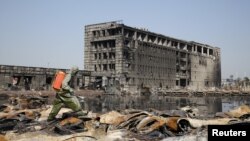At a time of increasing public concern in China over whether other industrial ports could see similar explosions like last week's deadly Tianjin blasts, state media reported that nearly 70 percent of chemical firms in Beijing which handle hazardous chemicals have failed on-site inspections.
Responding to the public pressure, authorities have launched what they are calling a nationwide overhaul of the sector’s safety and emergency practices.
Hazards have been found at 85 firms, including a branch of Sinopec Corp, the largest in Asia, following raids on 124 storage sites for dangerous chemicals in Beijing, according to the official Xinhua news agency.
Two of those firms were shut down, which excluded the oil refiner’s Beijing branch, despite inspectors finding its security personnel ill-quipped to put out an oil tank fire.
"Companies failing our inspections were ordered to suspend operations, and their warehouses will be put under 24-hour surveillance," Qian Shan, deputy inspector of the Beijing work safety bureau, was quoted as saying by Xinhua.
New Tianjin fires
Shortly after the inspection findings were made public, Chinese emergency workers raced to put out four new fires that had broken out close to the Tianjin blast site, where explosions at a warehouse storing dangerous chemicals killed 114 people last week.
According to Xinhua, three “ignition points” were within the core blast area and came from within an automobile distribution area nearby.
Outside Tianjin, port authorities in Shanghai have also conducted checks on the port’s logistics operators handling dangerous chemicals in an effort to ease safety concerns.
Elsewhere in China, a series of raids have also been ordered by the State Council in provinces, including Shandong, Sichuan, Guizhou, Tibet, Jilin and Inner Mongolia, according to a statement on the State Administration of Work Safety’s website.
As the nationwide inspection continues, an industry insider said he expects many more small chemical businesses to be suspended.
“It’s a matter of cost. Some of them just couldn’t afford to enhance safety-related equipment or offer staff trainings to tighten up their safety practice,” the source said, adding that “neither were owners fully aware of the severity of the hazards.”
Another industry watcher said some of the chemical sector’s businesses put profits before safety.
“It does exist that some small- and medium-sized businesses have taken advantage of the loophole in the [administrative] system and the regulation in pursuit of added value and better profits,” said Liu Yuhang, secretary general of the hazardous chemical logistics branch under the China Federation of Logistics & Purchasing.
Test for officials
Chinese President Xi Jinping has demanded a thorough investigation to determine who should be held responsible for the devastating explosions last week.
Industry observers say that could result in a crackdown that does help put the Chinese chemical industry back on a healthy track – if indeed authorities can follow through on the pledges.
Under the new measures, officials at any level will be held responsible in their lifetime for policies they create which then lead to environmental calamities. Supporters say that should create better environmental regulations.
“After the enactment of political accountability measures, a fundamental change will be made in the pursuit of politicians’ responsibilities. From now on, policymakers are expected to transcend party line,” said Ma Qingyu, a professor at the Chinese Academy of Governance.




